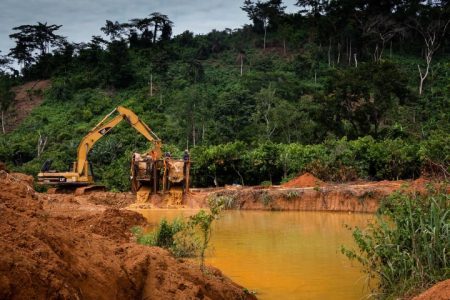The Ghanaian government, under the leadership of Interior Minister Mohammed Mubarak Muntaka, has initiated a robust crackdown on illegal mining operations, often referred to as “galamsey,” within the country. This campaign has resulted in the deportation of 107 foreign nationals since Minister Muntaka took office, with the vast majority, 92 individuals, being Chinese citizens. A further 13 individuals are scheduled for deportation in the coming week, signaling the government’s continued commitment to addressing this pervasive issue. This decisive action underscores the seriousness with which the government views galamsey and its detrimental impact on Ghana’s environment and socio-economic landscape.
The Minister’s pronouncements during an engagement with Imams and Zongo Chiefs emphasize the government’s zero-tolerance policy towards illegal mining. He highlighted the gravity of the problem, describing galamsey as one of Ghana’s most pressing challenges. The focus on foreign involvement, particularly from China, reflects the observed trend of international actors participating in these illicit activities. The Minister’s statement makes it clear that any foreign national found engaging in illegal mining, or related criminal enterprises like fraud, will face immediate deportation. This unequivocal stance aims to deter foreign participation in galamsey and protect Ghana’s resources.
The swift action of deporting apprehended foreign nationals involved in galamsey demonstrates the government’s commitment to enforcing its policy. The process bypasses lengthy legal proceedings, opting for immediate removal from the country. This approach is intended to send a strong message that Ghana will not tolerate illegal mining operations, regardless of the nationality of the perpetrators. It is a clear signal to potential foreign actors considering engaging in such activities that they will face swift and decisive consequences.
The government’s focus on galamsey stems from the widespread environmental damage it causes. Illegal mining operations often employ destructive methods that contaminate water sources, degrade fertile land, and contribute to deforestation. This environmental degradation has far-reaching consequences, impacting agriculture, water security, and biodiversity. Furthermore, the unregulated nature of galamsey poses significant safety risks to the miners themselves and surrounding communities, often leading to accidents and health hazards.
Beyond the environmental impact, galamsey also undermines Ghana’s economic interests. It contributes to revenue loss through tax evasion and the illicit export of precious minerals. This loss of potential revenue deprives the government of resources needed for development initiatives and public services. Furthermore, the unregulated and often violent nature of galamsey can create instability in affected regions, deterring legitimate investment and economic growth.
The deportation of foreign nationals involved in galamsey is part of a broader strategy to combat illegal mining in Ghana. This strategy likely encompasses increased law enforcement efforts, enhanced surveillance of mining areas, and community engagement to raise awareness about the detrimental effects of galamsey. The government’s commitment to tackling this issue signifies its recognition of the urgent need to protect Ghana’s natural resources, safeguard its economic interests, and ensure the well-being of its citizens. The sustained implementation of this strategy will be crucial in achieving a lasting solution to the problem of illegal mining in the country.














